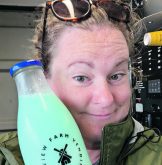Giving neighbours a second name was commonplace back in the day, but what to do when the ‘flower people’ arrived?
Back home on the farm, there were no such things as flocks and herds and litters.
To me they were all individual creatures, and I spent many solemn hours as a precocious kid mulling over names for the chickens the pigs, the pups and the kittens.
So maybe to a Rhode Island Red it made no difference that she was a hen without a name, but I considered it a poor reflection on me as a person. A name was my acknowledgement of her right to life, my acceptance of her unique contribution to the world. To let her go nameless was to deny the worth of her existence. For shame.
Read Also

Communication key to bridging generation gap
Each generation is shaped by the predominant forces at play during their formative years. Acknowledging these influences can improve communication among the generations.
Even the community at large seemed to support my philosophy. Individuals who normally would not have merited much by way of personal recognition enjoyed a special niche in rural society by virtue of their nicknames.
So maybe a certain old bachelor was not exactly eligible for a citizen-of-the-year award but he could regale the young fry with thrilling accounts of how he crossed the ocean in a bath tub. Captain Cook lives to this day in the hearts and minds of the home town community.
Despite owning two white horses instead of a blue ox, a jolly gossip was dubbed Bunyan, who in turn was an overweight contemporary of Slats. Then there was Tallerhead (as in beef fat) and King Tut, the Kingfish and Nursery Reimer, who owned an orchard.
Absurd as it may sound, such nicknames were not used in the derogatory sense, but to convey acceptance of one another, warts and all. Somehow, they were all bound up in the basic fabric of rural life, where to go nameless was the ultimate rebuff.
Imagine then, the community’s bewilderment when a sprinkling of the “flower people” took up squatter’s rights in the Pembina Hills during the early 1970s.
Above and beyond the curiosity and suspicions they provoked, what do you call people who clearly wished to remain anonymous? The dilemma was equivalent to my childhood frustration of naming the Rhode Island Reds, only these people were no chickens. They had purposefully turned their backs on the moneyed establishment and decided that a life torn free of status symbols was by far preferable to the farce their parents called success. They didn’t say it in so many words, of course. They just lived it. But what to call them?
At first, the community referred to them as “the hippies.” But then as personalities and pastimes surfaced, it was not unusual to hear locals talk about the Goat Hippy or the Paint Hippy or the Candle Hippy.
Soon the nicknames began to slip off the tongue with ease, indicating a growing acceptance of pigtails and patches.
Maybe it was important to the hippies to remain anonymous, but country folks just didn’t see it that way.
So instead of sinking into peaceful oblivion, the hippies found themselves being swept into the stream of community living, powerless to defend themselves against the natural tide of rural tradition that eventually engulfs all its citizens and gives them all a name, like it or not.
The hippies liked it. They were actually being accepted for who they were, which is the strength of rural communities right to this day.














